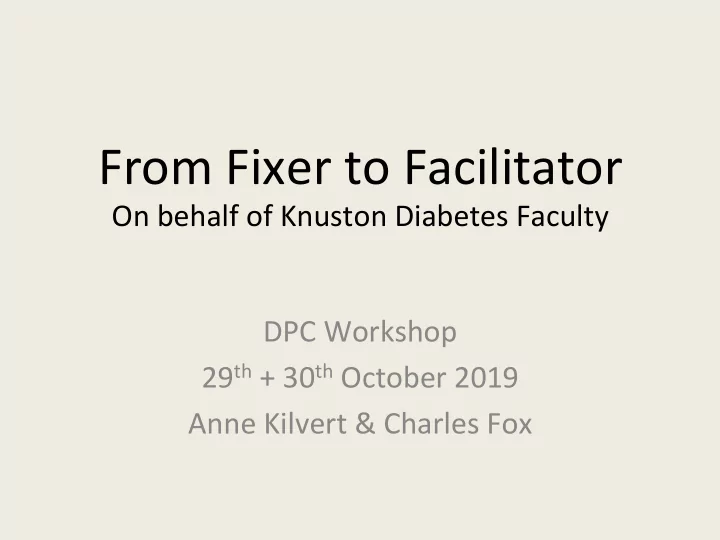

From Fixer to Facilitator On behalf of Knuston Diabetes Faculty DPC Workshop 29 th + 30 th October 2019 Anne Kilvert & Charles Fox
What will we do during this workshop? • Who is responsible for diabetes care? • Exercise 1: Giving advice • Stages of Empowerment • Exercise 2: Active listening • Counselling skills • Should we discuss feelings? • Exercise 3: Labelling feelings • A breather • Core conditions of person-centred care • Exercise 4: How to make things better • Diabetes Counselling and Empowerment 2020
The traditional approach patient hcp diabetes
The Reality hcp patient diabetes
The Ideal Thoughts HCP feelings patient diabetes
Empowering people with diabetes Bob Anderson and Martie Funnell Empowerment Principles: 98% of diabetes care is managed by the patient. When they make a choice, it should be an informed choice. The hard facts of diabetes: 1. Choices made by patients determine the outcomes 2. Control belongs to the patient after the consultation 3. Consequences of the choices made belong to the patient
1 st exercise: giving advice 2 minutes Work in pairs - #A and #B. #A has a desperate problem Hairstyle/tobacco/neighbour/job/partner/body odour ‘ … and now #B you must tell me what to do. After all you are the expert.’ #B is desperate to provide solutions but #A always rejects them! … well, have you tried?... … have you thought of … ? … why don’t you … ? After debriefing, swap roles
The 5 Stages of Empowerment 1. Explore the problem or issue 2. Recognise and acknowledge feelings 3. Develop a plan 4. Commit to action 5. Evaluate the plan
The 5 Stages of Empowerment 1. Explore the problem or issue 2. Recognise and acknowledge feelings 3. Develop a plan 4. Commit to action 5. Evaluate the plan This is a collaborative process
What skills are needed to support empowerment? Exercise 2
Exercise 2: Real listening 60 seconds #A tells a story about anything – say the journey to the conference #B listens carefully with eye contact and makes encouraging noises 30 seconds into the story, #B looks away and turns their back on #A #A continues with the story After debriefing, swap over #A and #B
What skills are needed to support empowerment? What counselling skills can you name?
What is the can of worms? Why are we afraid of it?
What is the can of worms? Why are we afraid of it? Could it be Strong ong Feelings eelings ?
Exercise 3: what prevents us from talking about feelings In the large group, please come up with ideas
Exercise 4: Knuston Video stage 2 Watch this carefully and write down as many feelings as you can. You may use different words for a similar feeling Unfortunately for reasons of confidentiality, we have had to delete the video
What is the best way of labelling feelings? • People rarely describe their feelings but it is often easy to see that someone is embarrassed or angry – have a go at naming the feeling • Use the sort of language that person will feel happy with • Get the right intensity of feeling: – “a bit put out” – “absolutely raging”
Quote from Carl Rogers 1902-1987 We think we listen, but very rarely do we listen with real understanding, true empathy. Yet listening of this very special kind, is one of the most potent forces for change that I know.
The Core Conditions of person-centred care • Empathy • Congruence (genuineness, authenticity) • Unconditional positive regard
How to make things better: ‘What do you want?’ • How would this situation have to change for you to feel better about it? • What other options have you considered? • What would you gain (or lose) by change?
Exercise 5: Knuston video stage 3 • Here the counsellor is helping the client come up with a realistic plan • Write down all the examples you note when the counsellor is encouraging the client to be concrete. • Unfortunately for reasons of confidentiality, we have had to delete the video
What will you do? • What actions will you take to reach? • Does this sound like something you can do? • How likely is it that you will do this?
Diabetes Counselling and Empowerment Course www.diabetescounselling.co.uk Are you a health professional working in diabetes? Would you like to develop your consultation skills? What can you do to help people self-manage their diabetes more effectively? Come to one of our courses at Knuston Hall Mon 4 th – Thurs 7 th May or Mon 21 st – Thur 24 th Sept 2020
Recommend
More recommend